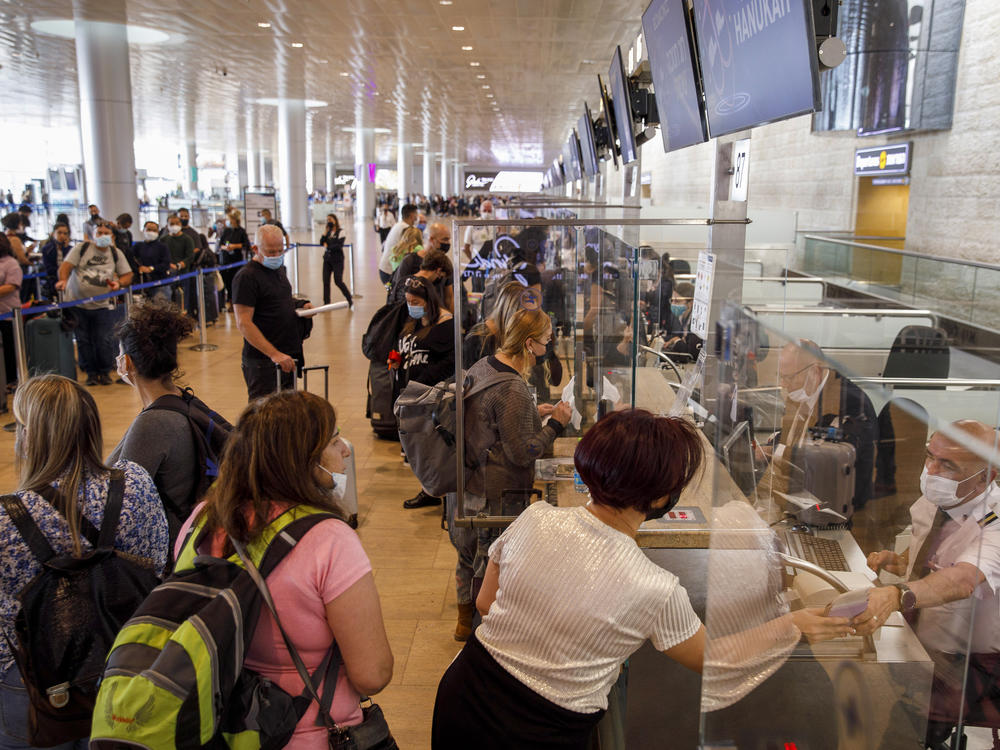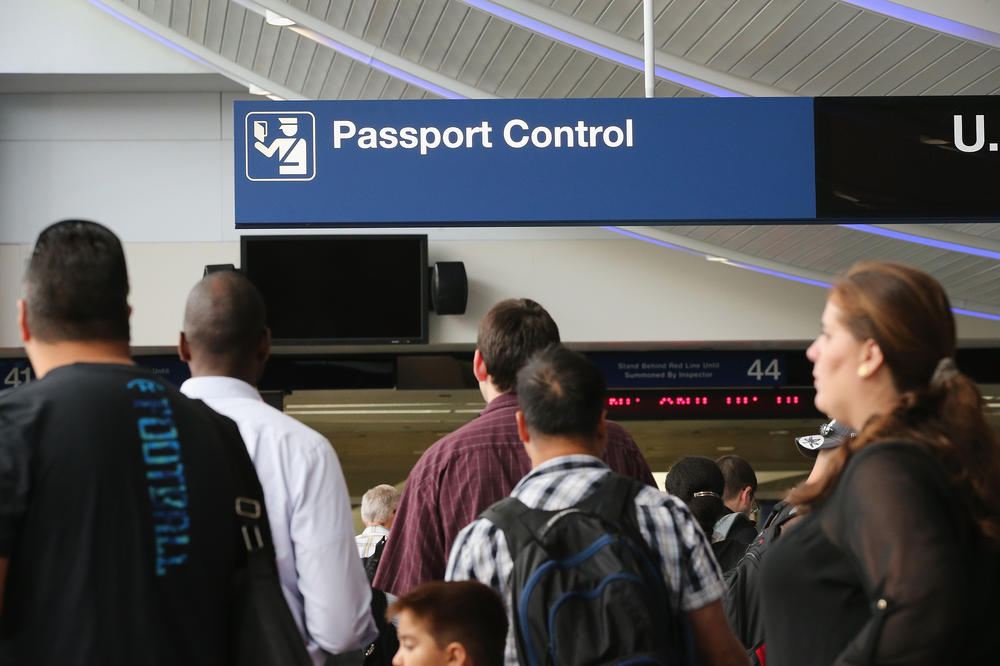Section Branding
Header Content
U.S. allows Israelis visa-free entry as Israel opens travel to Palestinian Americans
Primary Content
Updated September 27, 2023 at 10:53 AM ET
TEL AVIV, Israel — The U.S. said Wednesday it will allow Israeli tourists and businesspeople to enter the country without visas, an agreement that requires Israel to end bans and restrictions on the entry of Palestinian Americans and other Arab Americans.
Starting Nov. 30, Israelis will be able to travel to the U.S. for trips of up to 90 days without needing to wait months for a visa. Forty other countries are already granted the same privilege.
The U.S.-Israel deal represents a significant change in Israel's longstanding security paradigm of profiling and restricting the entry of Palestinian, Arab and Muslim visitors. Those measures were put in place because of airline hijackings 50 years ago, ongoing hostilities against Israel in the region and Israeli efforts to prevent an influx of Palestinians to the Jewish state.
The new agreement, negotiated over the last year and a half, overcame old fears in the U.S. that visa-free travel could help Israelis spy on U.S. soil.
It also resolved more recent concerns, like enforcing stricter rules on granting Israeli passports to new immigrants — effectively allowing the visa-waiver program to prevent an influx of Russians into the U.S. who gained Israeli citizenship since the war in Ukraine — and U.S. demands that Israel upgrade to post-Sept. 11 standards of airline security, U.S. officials say.
New freedom of movement for tens of thousands of Palestinian Americans
Under the deal, Israel has agreed to treat U.S. citizens "without regard to national origin, religion, or ethnicity," the Department of Homeland Security said in a statement.
Israel already phased in the measures this summer, allowing entry to Americans with origins or dual citizenship in countries like Iran, Iraq, Syria and Lebanon. Palestinian Americans with residency status in the occupied West Bank and the Gaza Strip may now access Israel's international airport, and U.S. officials say tens of thousands have visited Israel as a result.
"I drove through every single checkpoint between the West Bank and Israel I could," says Mohammed Manasrah, a Palestinian American. "Like, I would literally drive through the checkpoint, make a U-turn and come back. And it just feels like every time I go through a checkpoint, it's like I won."
Four Democratic senators said Wednesday they oppose Israel's admission into the visa-waiver program, arguing Israel still has not addressed all unequal treatment against Palestinian Americans. An Arab American rights group is seeking an injunction against Israel entering the program.
U.S. officials say they are working with Israel to solve remaining inequities, like restrictions at select border crossings on Palestinian Americans driving from the West Bank into Israel, and that Israel could be suspended from the visa-waiver program if it does not comply with its commitments.
U.S. concerns over Israeli security and espionage
The deal also addresses holes in Israel's border security policies, a surprising revelation given Israel's tough security stance.
Under the deal, Israel agreed to adopt U.S. and international airline passenger screening protocols established after the Sept. 11 attacks. Israel had previously relied on other security methods, including interrogations and profiling based on passenger risk.
Israel also accepted U.S. requests to place restrictions on granting passports to new immigrants, due to concerns that the U.S. would receive an influx of Russians who gained expedited Israeli citizenship since Russia's war in Ukraine began last year.
In 2014, when Israel lobbied to join the visa-waiver program, U.S. intelligence officials reportedly warned lawmakers it would help Israeli spies conduct espionage on U.S. soil. A U.S. official, speaking on condition of anonymity in a briefing to reporters ahead of Wednesday's announcement, dismissed that concern now.
"The U.S. intelligence community and law enforcement routinely evaluate potential potential counterintelligence risks from a host of countries. This is in the case of the visa waiver program," the official said. "The arrangements under the visa-waiver program do not represent any insurmountable obstacle to the work we do to protect the homeland from intelligence collection."
The politics behind the deal
Israelis have sought to be in the so-called visa-waiver program for decades, but Israel never qualified. Besides treatment of Arab Americans and espionage concerns, Israelis had a high visa rejection rate because of U.S. concerns that Israelis, like young veterans fresh out of the army, would overstay their visas.
Two years ago, there was an opening. Prime Minister Benjamin Netanyahu was ousted in an election, and after years of his sour relations with Democrats, a new, moderate Israeli governing coalition was formed that the Biden administration wanted to support, and the U.S. began working on the visa-free program for Israel.
Netanyahu was accused of holding up the process in parliament to prevent his opponents from scoring the political win. After Netanyahu returned to office, his government advanced the lifting of restrictions on Arab American travelers.
"If I had to guess, the security establishment would have preferred to keep things as they are. But the prime minister felt it's important," says Ehud Eiran, a former Israeli adviser to a previous prime minister. "To be cynical, I think he's in a very difficult time. And if a politician can tell Israelis, you can enter the U.S. without a visa — big political win."
As Netanyahu faces domestic protests and U.S. opposition for his overhaul of Israel's judiciary, he is promoting the mega-deal President Biden is seeking to broker for diplomatic relations between Israel and regional heavyweight Saudi Arabia.
Such a deal, the Biden administration says, will require Israel to agree to much larger concessions to the Palestinians than travel privileges for Palestinian Americans.
Copyright 2023 NPR. To see more, visit https://www.npr.org.


